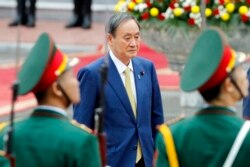Japan and Vietnam have agreed to increase defense and security cooperation in answer to China’s growing power in East Asia.
Japanese Prime Minister Yoshihide Suga and Vietnamese Prime Minister Nguyen Xuan Phuc met in Hanoi on Monday. It was Suga’s first overseas trip since taking office last month.
At their talks, the two men agreed that Japan can begin exporting defense equipment and technology to Vietnam. Japan has been seeking such agreements to expand its ties with Southeast Asia and sustain its own defense industry.
Suga said that his four-day trip to Vietnam, and later Indonesia, was important. He is seeking economic and security relationships to slow China’s growing power and protect shipping in disputed areas of the South China Sea.
"Vietnam is important for our goal of a ‘Free and Open Indo-Pacific,’ and our valuable partner,” Suga told reporters after his meeting with Phuc.
“Japan, as an Indo-Pacific nation, will continue to contribute to the peace…in this region,” he added.
Neither of the two leaders spoke about China by name in their press conference.
Phuc said the peace and stability of the South China Sea should be protected by the rule of law, and not by any nation’s force or threats. He added that Vietnam “appreciates” Japanese efforts to keep peace “in the region and the world.”
Later Monday, Suga spoke about the Association of Southeast Asian Nations and a policy its members approved in 2019. He noted that the “[Association of Southeast Asian Nations] Outlook on the Indo-Pacific” and Japan’s “Free and Open Indo-Pacific” policy share values such as the rule of law, openness and freedom.
The Japanese leader spoke at Vietnam-Japan University. In his speech, Suga criticized China indirectly.
“There is a move in the South China Sea that goes against the rule of law and openness stated in this...Outlook, and Japan strongly opposes any attempt that escalates tensions in the South China Sea,” he said.
Also on Monday, Japanese Defense Minister Nobuo Kishi announced that Japan’s military will join exercises with the U.S. and Australian navies around the South China Sea. Kyodo news agency reported his comments.
Kishi met in Tokyo with Australian Defense Minister Linda Reynolds. They agreed to open talks that would let Japan’s military protect Australian warships and aircraft in the area, Kyodo said. Japan already has a similar agreement with the United States.
Japan already has defense equipment transfer deals with the U.S., Britain and Malaysia, among other countries. Japan is still negotiating similar deals with Indonesia and Thailand.
In August, Japan made its first defense export, sending a radar system to the Philippines.
Suga called the agreement “a major step” for defense cooperation between the two countries. He also said he expects more developments in the future.
For many years, Japan banned the export of military equipment and technology. But that changed in 2014 as part of former Prime Minister Shinzo Abe’s efforts to build Japan’s defense strengths.
Japan is one of Vietnam’s top trading partners, with two-way trade of $28.6 billion already this year. Japan also sends a lot of aid money to Vietnam. Last year, it gave Vietnam about $23 billion.
The Japanese government has been trying to get Japanese companies to invest in Vietnam and other Southeast Asian countries. They hope to lessen Japan’s dependence on manufacturing and other businesses in China.
I’m Susan Shand.
The Associated Press and Reuters News Agency reported this story. Susan Shand adapted it for Learning English. George Grow was the editor.
________________________________________________________________
Words in This Story
sustain – v. to be able to maintain itself
contribute – v. to add something
region – n. an land or cultural area
stability – n. to be calm, without chaos
appreciate – v. to be grateful for something
escalate – v. to make either better or worse
transfer – v. to move from one place to another






